The question of whether demonic possession is possible touches on various disciplines, including religion, psychology, cultural studies, and medicine. Here is a summary from different perspectives:
Religious and Cultural Perspectives
Christianity: Many branches, especially within Catholicism, affirm the possibility of demonic possession. The Catholic Church has specific rites of exorcism to deal with such cases. Biblical references, such as those found in the Gospels, describe instances where Jesus exorcised demons from individuals.
Islam: Belief in jinn (supernatural beings) is common, and some Muslims believe that jinn can possess humans. Islamic exorcism rituals (ruqyah) are performed to expel these beings.
Hinduism: Some Hindu traditions recognize the concept of demonic possession and have rituals to expel malevolent spirits.
Other Cultures: Many indigenous and folk cultures around the world have beliefs in spirits or entities that can possess individuals, with corresponding rituals for dealing with such occurrences.
Psychological and Medical Perspectives
Mental Health: From a psychological perspective, what is often perceived as possession may be explained by mental health disorders such as dissociative identity disorder (DID), schizophrenia, or other psychotic disorders. These conditions can cause individuals to exhibit behaviors or voices that seem alien to their normal personality.
Neurology: Some neurological conditions, like epilepsy, can cause symptoms that might be interpreted as possession in certain cultural contexts.
Cultural Psychiatry: The field of cultural psychiatry studies how cultural beliefs and practices influence the manifestation and treatment of psychiatric disorders. Cultural context can shape how symptoms are expressed and understood.
Scientific Consensus
The scientific consensus does not support the existence of demonic possession. Most phenomena attributed to possession can be explained through psychological, psychiatric, or neurological means. The scientific approach prioritizes natural explanations over supernatural ones, focusing on empirical evidence and testable hypotheses.
Conclusion
While belief in demonic possession is widespread across various cultures and religions, the scientific community attributes such experiences to psychological or neurological disorders. Individuals who feel they are possessed or are exhibiting symptoms should seek professional medical advice to explore potential underlying health issues
The Exorcism of Anneliese MichelThe case of Anneliese Michel is one of the most famous and controversial instances of exorcism in modern history. Here is an overview of her story:
Background
Anneliese Michel was born on September 21, 1952, in Leiblfing, Bavaria, Germany. She was raised in a devout Roman Catholic family. Her life took a tragic turn during her teenage years when she began experiencing severe psychiatric symptoms.
Symptoms and Medical Treatment
At the age of 16, Anneliese started experiencing convulsions and was diagnosed with temporal lobe epilepsy. She subsequently suffered from depression and hallucinations, for which she received psychiatric treatment. Despite various medications, her condition did not improve, and she continued to deteriorate.
Belief in Possession
Anneliese and her family, deeply religious, came to believe that her condition was not purely medical but also spiritual. They concluded that she was possessed by demonic forces, given the nature of her symptoms and her reported aversion to religious objects.
Exorcism
In 1975, two priests, Ernst Alt and Arnold Renz, were granted permission by the local bishop to perform the exorcism rite according to the Rituale Romanum of 1614. Over the next ten months, Anneliese underwent 67 exorcism sessions, each lasting up to four hours.
Death and Aftermath
Anneliese Michel died on July 1, 1976, at the age of 23. The official cause of death was malnutrition and dehydration; she had stopped eating and drinking for an extended period. Her parents and the priests were later charged with negligent homicide. During the trial, it was argued that Anneliese's death could have been prevented if she had received proper medical care.
Trial and Verdict
In 1978, the court found the parents and the priests guilty of manslaughter resulting from negligence. They were sentenced to six months in prison (suspended) and three years of probation. The trial attracted significant media attention and sparked a debate on the intersection of religion, mental health, and the responsibilities of caregivers.
Legacy and Cultural Impact
The case of Anneliese Michel has been the subject of numerous books, documentaries, and films. The most notable film inspired by her story is "The Exorcism of Emily Rose" (2005), which blends elements of horror with courtroom drama.
Analysis
Medical Perspective: From a medical standpoint, Anneliese likely suffered from severe mental health disorders, including epilepsy, psychosis, and potentially dissociative disorder. Her symptoms, such as aversion to religious objects and hearing voices, can be understood within the context of these conditions.
Religious Perspective: For many, the case underscores the belief in demonic possession and the efficacy of exorcism rites. It also highlights the profound impact of religious faith on interpreting and dealing with severe psychological distress.
Ethical and Legal Perspective: The case raises significant ethical questions about the role of religion in medical treatment, the responsibilities of caregivers, and the legal implications of neglect in favor of spiritual interventions.
Conclusion
The story of Anneliese Michel remains a poignant example of the complex interplay between faith, mental health, and the law. It serves as a cautionary tale about the importance of comprehensive medical treatment and the potential dangers of interpreting psychiatric conditions through a solely religious lens



0 Comments
messags